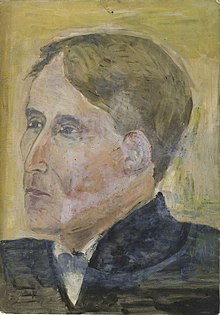
Back ارثر والى (مترجم) ARZ Artur Veyli Azerbaijani آرتور والی AZB Arthur Waley Catalan Arthur Waley German Arthur Waley Spanish آرتور ویلی Persian Arthur Waley Finnish Arthur Waley French ארתור ויילי HE
Arthur Waley | |||||||||
|---|---|---|---|---|---|---|---|---|---|
 A portrait of Waley by Ray Strachey | |||||||||
| Born | 19 August 1889 | ||||||||
| Died | 27 June 1966 (aged 76) London, England | ||||||||
| Resting place | Highgate Cemetery | ||||||||
| Alma mater | Cambridge University (did not graduate) | ||||||||
| Known for | Chinese/Japanese translations | ||||||||
| Chinese name | |||||||||
| Traditional Chinese | 亞瑟・偉利 | ||||||||
| Simplified Chinese | 亚瑟・伟利 | ||||||||
| |||||||||
| Japanese name | |||||||||
| Kana | アーサー・ウェイリー | ||||||||
| |||||||||
Arthur David Waley CH CBE (born Arthur David Schloss, 19 August 1889 – 27 June 1966) was an English orientalist and sinologist who achieved both popular and scholarly acclaim for his translations of Chinese and Japanese poetry. Among his honours were appointment as Commander of the Order of the British Empire in 1952, receiving the Queen's Gold Medal for Poetry in 1953, and being invested as a Member of the Order of the Companions of Honour in 1956.[1]
Although highly learned, Waley avoided academic posts and most often wrote for a general audience. He chose not to be a specialist but to translate a wide and personal range of classical literature. Starting in the 1910s and continuing steadily almost until his death in 1966, these translations started with poetry, such as A Hundred and Seventy Chinese Poems (1918) and Japanese Poetry: The Uta (1919), then an equally wide range of novels, such as The Tale of Genji (1925–26), an 11th-century Japanese work, and Monkey, from 16th-century China. Waley also presented and translated Chinese philosophy, wrote biographies of literary figures, and maintained a lifelong interest in both Asian and Western paintings.
A 2004 profile by fellow sinologist E. Bruce Books called Waley "the great transmitter of the high literary cultures of China and Japan to the English-reading general public; the ambassador from East to West in the first half of the 20th century", and went on to say that he was "self-taught, but reached remarkable levels of fluency, even erudition, in both languages. It was a unique achievement, possible (as he himself later noted) only in that time, and unlikely to be repeated."[2]
- ^ Johns (1983), p. 179.
- ^ Brooks, E. Bruce (1 July 2004). "Sinological Profiles: Arthur Waley". Warring States Project. University of Massachusetts at Amherst.